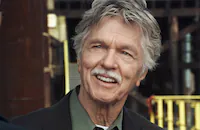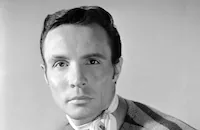The Turning Point
Brief Synopsis
Cast & Crew
Herbert Ross
Shirley Maclaine
Anne Bancroft
Mikhail Baryshnikov
Leslie Browne
Tom Skerritt
Film Details
Technical Specs
Synopsis
Former dance colleagues Deedee and Emma are reunited when Emma's New York ballet company stops in Oklahoma City for a performance. Having dropped her career for marriage and motherhood, Deedee envies prima ballerina Emma's limelight life; aging Emma, realizing that her days as a star are numbered, wishes that she had the fulfillment of a family like Deedee's. Tensions simmer when Deedee's talented teenage daughter Emilia moves to New York to join Emma's company. As Emma maternally bonds with Emilia, and Emilia falls in love with womanizing dancer Yuri, Deedee feels that she's losing her place even as a mother. After Emilia's triumphant debut, Deedee's and Emma's resentments boil over into an all-out catfight that ends when they realize that they can unite in happiness for Emilia's future.
Director

Herbert Ross
Cast

Shirley Maclaine

Anne Bancroft
Mikhail Baryshnikov
Leslie Browne

Tom Skerritt

Martha Scott
Antoinette Sibley
Alexandra Danilova
Starr Danias

Marshall Thompson

James Mitchell
Scott Douglas
Daniel Levans
Jurgen Schneider

Anthony Zerbe
Phillip Saunders
Lisa Lucas
Saax Bradbury
Hilda Morales
Donald Petrie
James Crittenden
David Byrd
Alexander Minz
Dennis Nahat
Enrique Martinez
Anne Barlow
Howard Barr
Martha Johnson
Lucette Aldous
Fernando Bujones
Richard Cragun
Suzanne Farrell
Marcia Haydee
Peter Martins
Clark Tippet
Marianna Tcherkassky
Martine Van Hamel
Charles Ward
Kenneth Macmillan
Crew
Adolphe Adam
Alvin Ailey
Lucette Aldous
Frederick Ashton
George Balanchine
Anne Bancroft
Mikhail Baryshnikov
Tony Bishop
Albert Brenner
Leslie Browne
Fernando Bujones
Peter Burrell
Frederic Chopin
Jean Coralli
Richard Cragun
John Cranko
Carl Czerny
Glenn Dictorow
Scott Douglass
Duke Ellington
Suzanne Farrell
Wayne Fitzgerald
William Hartman
Marcia Haydee
Howard Jeffrey
Jerry Jost
Nora Kaye
John Lanchbery
Harald Lander
Arthur Laurents
Arthur Laurents
Kenneth Macmillan
Marvin March
Peter Martins
Ludwig Minkus
Alexander Minz
Dennis Nahat
Jules Perrot
Marius Petipa
Nananne Porcher
Serge Prokofiev
William H. Reynolds
William Reynolds
Jack Roe
Herbert Ross
Roger Rothstein
Charles Schram
Antoinette Sibley
Oliver Smith
Theodore Soderberg
Richard Sperber
Robert Surtees
Robert Surtees
Peter Ilyich Tchaikovsky
Henryk Wieniawsky
Albert Wolsky
Film Details
Technical Specs
Award Nominations
Best Actress
Best Actress
Best Art Direction
Best Cinematography
Best Director
Best Editing
Best Picture
Best Sound
Best Supporting Actor
Best Supporting Actress
Best Writing, Screenplay
Articles
Martha Scott, 1914-2003
Martha Ellen Scott was born in Jamesport, Missouri on September 24, 1914, and raised in Kansas City, where a high school teacher encouraged her interest in acting. She majored in drama at the University of Michigan and after graduation, she joined The Globe Theatre Troupe, a stock company that performed truncated Shakespeare at the Chicago World's Fair in between 1933-34. She went to New York soon after and found work in radio and stock before playing making her breakthrough as Emily Webb in Our Town. When the play opened on Broadway in February 1938, Scott received glowing reviews in the pivotal role of Emily, the wistful girl-next-door in Grovers Corners, New Hampshire, who marries her high school sweetheart, dies in pregnancy and gets to relive a single day back on Earth. Her stage success brought her to Hollywood, where she continued her role in Sam Wood's film adaptation of Out Town (1940). Scott received an Academy Award nomination for best actress and was immediately hailed as the year's new female discovery.
She gave nicely understated performances in her next few films: as Jane Peyton Howard in Frank Lloyd's historical The Howards of Virginia (1940), opposite Cary Grant; the dedicated school teacher in Tay Garnett's Cheers for Miss Bishop (1941) in which she aged convincingly from 17 to 85; and as a devoted wife to preacher Frederic March in Irving Rapper's warm family drama One Foot in Heaven (1941). Sadly, Scott's maturity and sensitivity ran against the glamour-girl persona that was popular in the '40s (best embodied by stars like Lana Turner and Veronica Lake) and her film appearances were few and far between for the remainder of the decade.
Her fortunes brightened in the '50s, when she found roles in major productions, such as a suburban wife trapped in her home by fugitives, led by Humphrey Bogart, in William Wyler's taut The Desperate Hours (1955) and played Charlton Heston's mother in the Cecil B. Demille's The Ten Commandments (1956) and again for William Wyler in Ben-Hur (1959). Scott found steady work for the next 30 years in matronly roles, most notably on television, where she played Bob Newhart's mother on The Bob Newhart Show (1972-1978) and the mother of Sue Ellen Ewing on Dallas (1978-1991). Her second husband, pianist and Pulitzer Prize-winning composer Mel Powell, died in 1998. Survivors include a son and two daughters.
by Michael T. Toole

Martha Scott, 1914-2003
Quotes
Care to have supper?- Yuri
I'm busy.- Emilia
After supper?- Yuri
Bed.- Emilia
Ok! . . . Emilia, it's joke!- Yuri
You know, only this morning she came up to me and she said, "Sevilla, deary, you're the greatest prima ballerina in the whole world".- Sevilla
No, I am.- Yuri
Trivia
Jointly holds the record (with Color Purple, The (1985)) for the film with most Oscar nominations without a single win (11).
Audrey Hepburn was offered one of the lead roles in this film.
'Grace Kelly' was offered one of the leads in the film.
Miscellaneous Notes
Released in United States Fall November 14, 1977
Released in United States Fall November 14, 1977













